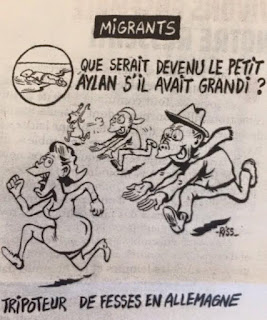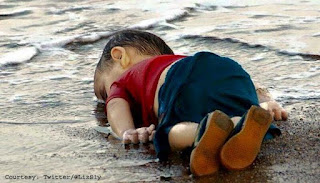Charlie Hebdo: ... s'est reparti

Recently, Charlie Hebdo featured a cartoon that purportedly provided commentary on the refugee situation and accusations of sexual misconduct in Germany by controversially depicting Aylan Kurdi—the three-year-old Syrian boy whose tragic drowning captured global attention—as a grown "pig-faced" individual chasing "white" women. The questionable caption asks what Aylan might have grown up to become, implying he would be an assailant in Germany.
The illustration, created by Laurent Sourisseau, who is the magazine's current director and a survivor of the terrorist attack at Charlie Hebdo's offices, appears to underscore the claims that refugees, including Syrians, were among the perpetrators of the sexual assaults reported in Cologne, Germany, on New Year's Eve.
Despite the claims of Charlie Hebdo that it champions a "healthy critical attitude," the overtly provocative nature of the cartoon borders on sheer sensation-seeking. Indeed, misinterpretations of such inflammatory cartoons are not only foreseeable but perhaps intended, as they inevitably stir controversy and, as a consequence, have a tendency to spur magazine sales. But the implications run deeper...
Islam in Europe: Public Spaces and Civic Networks, discusses the repercussions of an earlier case where another press medium, the Danish conservative daily Jyllands-Posten invited Danish caricaturists to "imagine" the prophet Muhammad. The Muhammad cartoons controversy (as it eventually became known) was sparked by the publication of 12 caricatures on the theme of the prophet Muhammad on 30 September 2005. The newspaper culture editor, Flemming Rose, justified the publication of the caricatures on the grounds of the need to have a debate on the nature of Islam as a religion and system of cultural values as well as of the importance of addressing the predominant Western culture of encouraging or imposing self-censorship among intellectuals when they touch upon difficult issues. Danish Muslim organizations found the caricatures offensive – some argued that the conflation of the prophet with terrorism or bigotry was offensive, some suggested that depicting the prophet is tantamount to blasphemy, while others suggested that this was a racist attack against Danish Muslims. The controversy soon transcended Denmark’s borders with protests in both the West and Muslim countries and a proposed boycott of Danish products and newspapers in 49 countries reprinting the caricatures in the name of free speech. The controversy was seen by many on the Right but also across the political spectrum as the product of the failed multiculturalist project in the West, whereas it brought to the foreground of public debate the tension between the right to engage in critical free speech and the responsibility not to demean or denigrate the other while doing so. A Pew Global Attitudes Survey (2006) found that awareness
of the 2005 riots in France was relatively high among other Muslims living in the West. But what is more interesting is that Western Muslims ‘irrespective of their views about the riots per se – say they are sympathetic to the youths from immigrant and working-class suburbs in France’. Our own findings in Islam in Europe corroborate this but go a step further as they provide insights into how this sympathy is articulated in the discourse of our informants. Over half of our non-French interviewees, when prompted to discuss issues of societal fairness and injustice that affect them, mentioned in their lists of injustice directly experienced by them the inequalities and prejudice that prompted their French counterparts to riot, even when they did not actually share the living through the social and spatial segregation the French youth involved in the riots have been experiencing. Again, many mentioned in the same context the Mohammed cartoons published in the Danish newspaper Jyllands-Posten on 30 September 2005 as well as earlier debates on employment or school bans of Muslim women wearing the headscarf which they interpreted as proof of discrimination even though many had not experienced such bans in their own societies.
Having said that, my comment here does in no way affect my condemnation of terrorism in the name of Islam but urgently invites reflection on the way we in the West hastily generalize (we share Charlie Hebdo's tendency to extrapolate from isolated instances) and conveniently externalize the problem of the so-called Muslim 'radicalization'.




Comments
Post a Comment